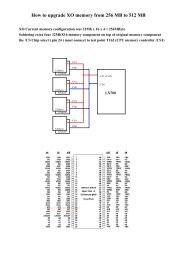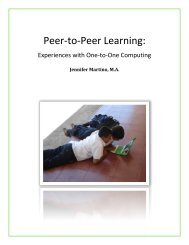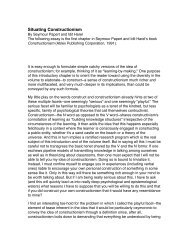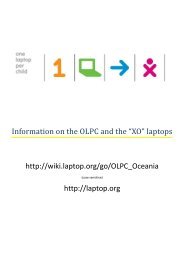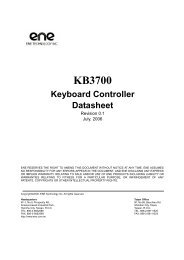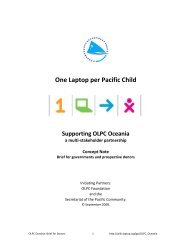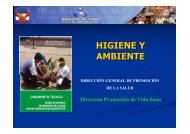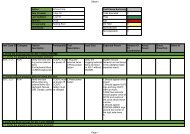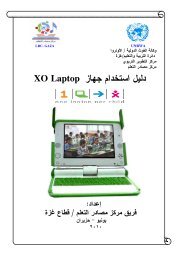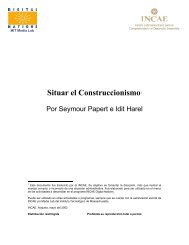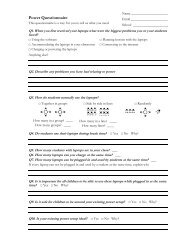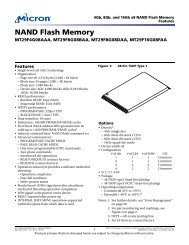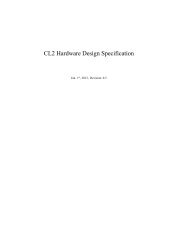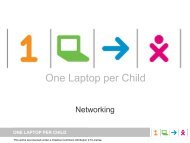eLearn: Feature Article - The OLPC Wiki - One Laptop per Child
eLearn: Feature Article - The OLPC Wiki - One Laptop per Child
eLearn: Feature Article - The OLPC Wiki - One Laptop per Child
Create successful ePaper yourself
Turn your PDF publications into a flip-book with our unique Google optimized e-Paper software.
<strong>eLearn</strong>: <strong>Feature</strong> <strong>Article</strong>http://elearnmag.org/subpage.cfm?section=articles&article=43-13 of 6 4/11/2007 10:43 AMnotion of software for and by the people (including rights to use, modify, and share code as necessary),this is no small matter. "A non-free program denies the user's freedom," says Stallman, "and myconscience forbids me to recommend the use of one. This means that as long as the <strong>OLPC</strong> requires use ofthat non-free firmware, I can't promote use of the <strong>OLPC</strong> as I would otherwise wish to." He acknowledgeshow far the project has come toward meeting what he sees as an essential goal, but for him it doesn'tmake it to the finish line. "<strong>The</strong> <strong>OLPC</strong> gets 99 <strong>per</strong>cent of the way to rejecting freedom-trampling software. Ihope that someday they will get all the way there," says Stallman.<strong>The</strong> 99 <strong>per</strong>cent figure could represent an uneasy truce between Richard Stallman and Walter Bender,<strong>OLPC</strong> President of Software and Content. <strong>The</strong> open atmosphere of software development for <strong>OLPC</strong> has letcontributors examine, revise, dogfood, re-examine, and streamline code until what goes on the XO isincredibly trim—and, well, free.Again, this project is supported by the philosophy of education that underlies it, which is not just anidealistic stance in this case, but a concrete commitment to principles—like listening to dissent,communicating with all those involved in the project, and refining work as it evolves.<strong>The</strong> Educational Sticky-TrapWalter Bender has been clear in saying that education could benefit from a paradigm that allows morecritical evaluation from people at all levels, and he's frank in suggesting that the traditional schoolhierarchy is a barrier to quality improvement. In his words, "the education community, because of theway school and (<strong>per</strong>haps more significantly) school systems are structured, typically top down, tends tosuppress the spread of best practice as it is developed bottom-up in the classroom."It's hard to argue with the idea that a top-down hierarchical structure suppresses good ideas from inspiredpractitioners (like students and teachers), as it short-circuits criticism of prevailing conditions that mightmake the system self-correcting. <strong>The</strong> problem is, many existing school systems might refuse to acceptthat philosophy. So as children across the planet suddenly have access to one another and to a rich mineof information through the XO, will education and schools conflict—as so often they do? How will thechanging educational landscape fit with existing schoolroom models?Ethan Zuckerman is an activist and researcher based at the Berkman Center for Internet and Society atHarvard Law School. He has traveled widely in the developing world and has studied <strong>OLPC</strong> in depth. Hesees places the <strong>OLPC</strong> laptop might meet resistance as it bumps up against cultural practice, physicalconsiderations, and teaching styles. "Some—not all—classrooms in the developing world work under avery authoritarian model, where the teacher uses techniques like recitation, repetition, and lecture to theentire class to maintain tight control of student behavior," says Zuckerman.Some of the problems he sees in schoolrooms in the developing world are echoed here in our own halls oflearning. "Educational systems that teach to standardized national tests mean that the emphasis is onmaking sure a <strong>per</strong>centage of students learn enough information to pass the national exams, and less onlearning through self-guided exploration, which is what the <strong>OLPC</strong> project is designed to enable."Classroom issues that might conflict with laptop use are not limited to the developing world, which issomething that becomes clear as Zuckerman talks about what he calls "less-direct ways in which <strong>OLPC</strong>might prove subversive within the classroom."Unfortunately some of the most innovative and education-supportive features of the laptop could causethe greatest problems. "<strong>The</strong> o<strong>per</strong>ating system of the laptop is designed around the idea of'presence'—you're aware of every other laptop in your proximity, and you can send messages to each ofthese other laptops. Imagine a room filled with students capable of passing digital notes to each other atevery point during a lesson—many teachers would find this a potentially troubling development,"Zuckerman suggests.You think?And if that's not enough to unnerve a teacher who isn't sure how to integrate technology, Zuckerman hasmore. "I'll offer a third concern based on my own ex<strong>per</strong>ience teaching at one of America's top law schools—students armed with Internet-connected laptops can be very intimidating to teach. Any assertion youoffer as a teacher, they can challenge with Google. (And believe me, when you're teaching lawyers, theywant to challenge you.) I can imagine some teachers finding this ex<strong>per</strong>ience of being challenged on factssufficiently frightening to heavily constrain computer use in the classroom."



